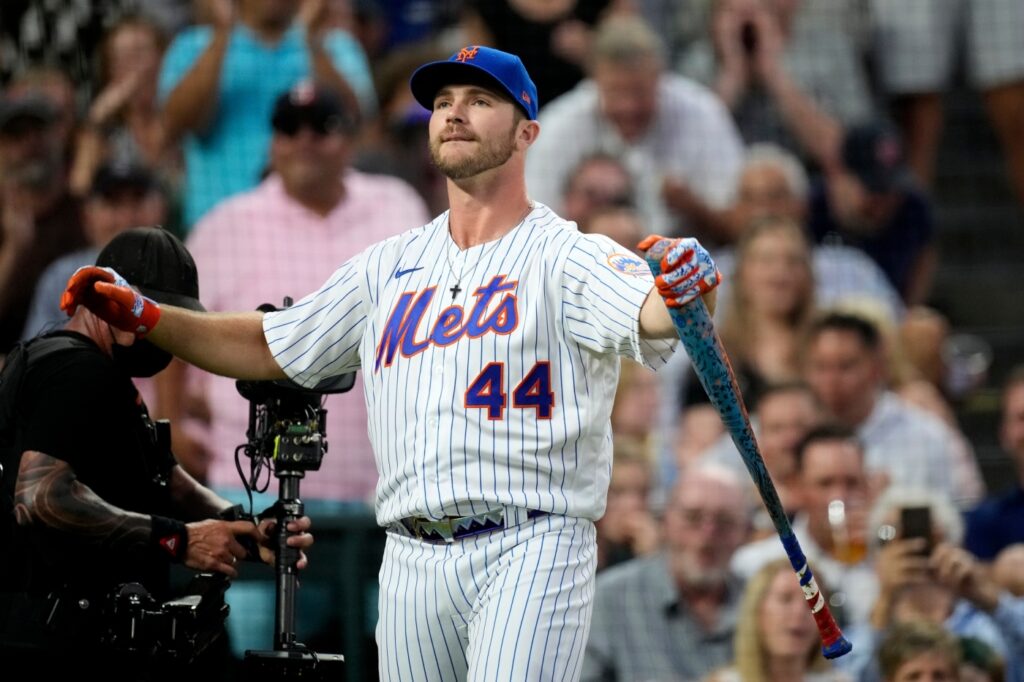
LOS ANGELES ― The stars will be out for the 2022 Home Run Derby, the first time the event has ever been held at Dodger Stadium.
Defending Derby champion Pete Alonso of the New York Mets is looking to join Ken Griffey Jr. as the only three-time winners in the event’s history and the first to win it three consecutive times. Seventh-seeded Atlanta Braves outfielder Ronald Acuña Jr. will be his opponent in the first round. Alonso, seeded No. 2 this year, ousted Acuña in the opening round of the eight-man bracket-style competition in 2019.
Alonso homered three times during the Mets’ four-game series at Chavez Ravine last month and is the first player in the 60-year history of Dodger Stadium to go deep seven times in his first 11 games played here.
No current Dodgers or Angels will participate in the event, but former Dodgers shortstop Corey Seager and St. Louis Cardinals designated hitter Albert Pujols – a former Dodger and Angel – will both participate.
Seager is the No. 3 seed and will face off with sixth-seeded rookie sensation Julio Rodriguez of the Seattle Mariners in the first round. Pujols is the No. 8 seed and will face off with top-seeded Philadelphia Phillies slugger Kyle Schwarber, the National League home run leader, in the first round.
Fourth-seeded Washington Nationals DH Juan Soto and fifth-seeded Cleveland Guardians third baseman Jose Ramirez will face off in the other first-round Derby matchup.
The winner of the Schwarber-Pujols matchup faces either Soto or Ramirez in the second round. On the other side of the bracket, the Alonso-Acuña winner faces the Seager-Rodríguez winner. The two players left standing will meet in the final round.
Seeds were based on the number of home runs each player had hit by Thursday, when the Derby field was announced. The higher-seeded player will bat second in each single-elimination round.
The popular timed-competition format was instituted in 2015. Batters will have three minutes to hit as many home runs as possible in the first and second rounds, and two minutes in the final round.
Each batter gets an extra 30 seconds after regulation time expires. Batters can earn an additional 30 seconds if they hit at least one home run that equals or exceeds 440 feet, as measured by Statcast. Batters are entitled to call one 45-second timeout per round. Ties will be broken with a 60-second swing-off, if necessary.
Related Articles
Angels select Zach Neto 13th overall in downtown’s first MLB draft
Dodgers’ Freddie Freeman added to NL All-Star roster
Mookie Betts and the Dodgers: Two years in, it’s a happy marriage
Angels’ Mike Trout pulls out of All-Star Game because of bad back
Verlander, Cole, Fried inactive for All-Star Game after weekend starts
The switch from each player having 10 outs to a timer has had its desired effect, with balls leaving the yard at a prodigious rate.
The final year of the 10-out format over four rounds in 2014 saw a combined 78 home runs among 10 players. When MLB went to an eight-player bracket and timed format the following year, the total nearly doubled to 159.
Last year at Denver’s Coors Field saw 309 homers, including 208 in the first round. The high-water mark is 311 from 2019 in Cleveland.
The total prize pool is $2.5 million, of which $1 million goes to the winner. Players will be mic’d up during the Derby, but there won’t be any cameras on their caps or on the catcher.
ESPN has the exclusive television rights to the Derby. An alternate broadcast will air live on ESPN2. The Dodgers’ Hall of Fame broadcaster Jaime Jarrín, who announced he will retire at the end of this year, has the Spanish radio play-by-play duties.
MLB ALL-STAR HOME RUN DERBY
When: Monday, 5 p.m.
Where: Dodger Stadium
TV/radio: ESPN, ESPN2 (Statcast), 710 AM, 830 AM, 1330 AM (Spanish)
The Associated Press contributed to this story.
